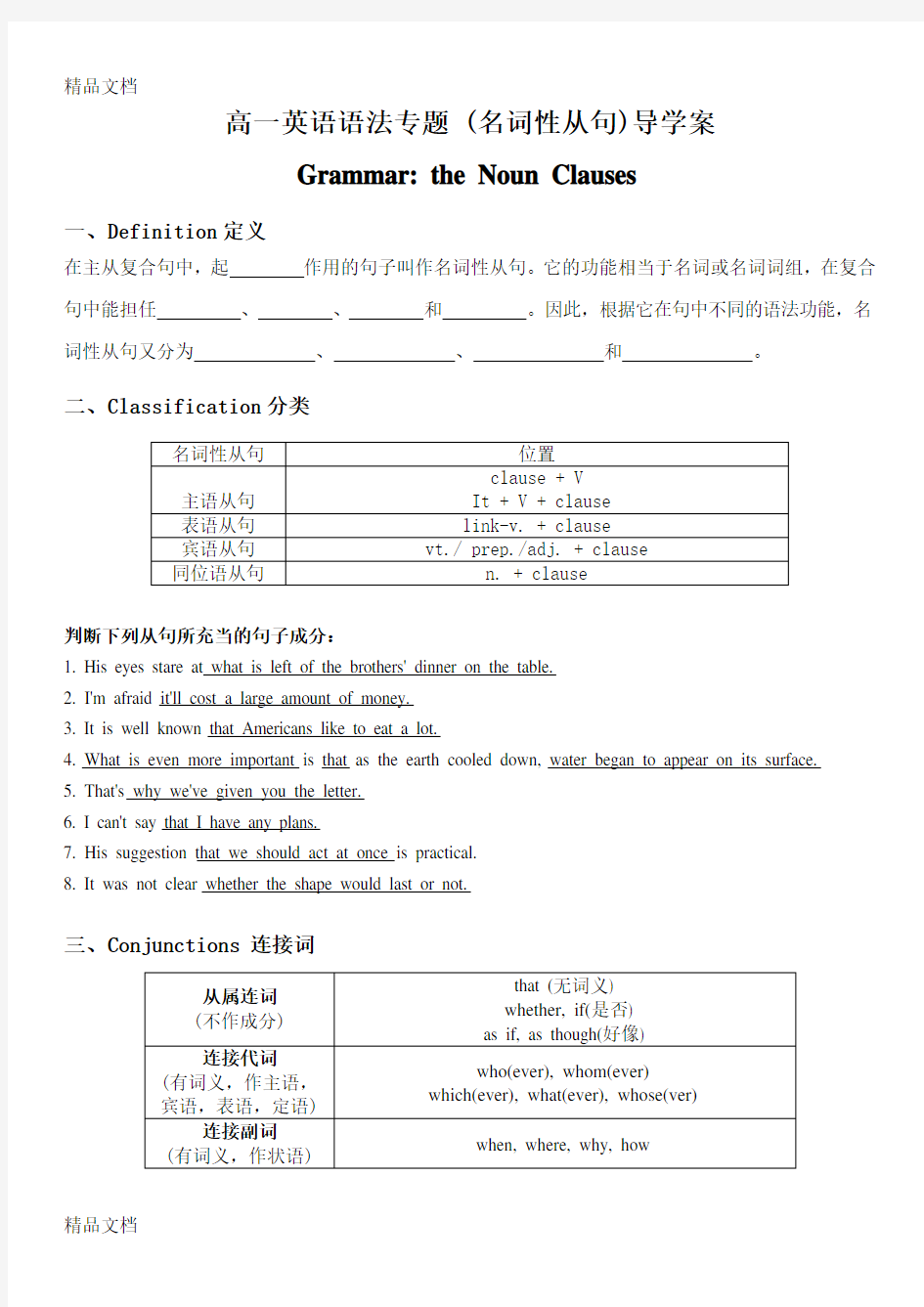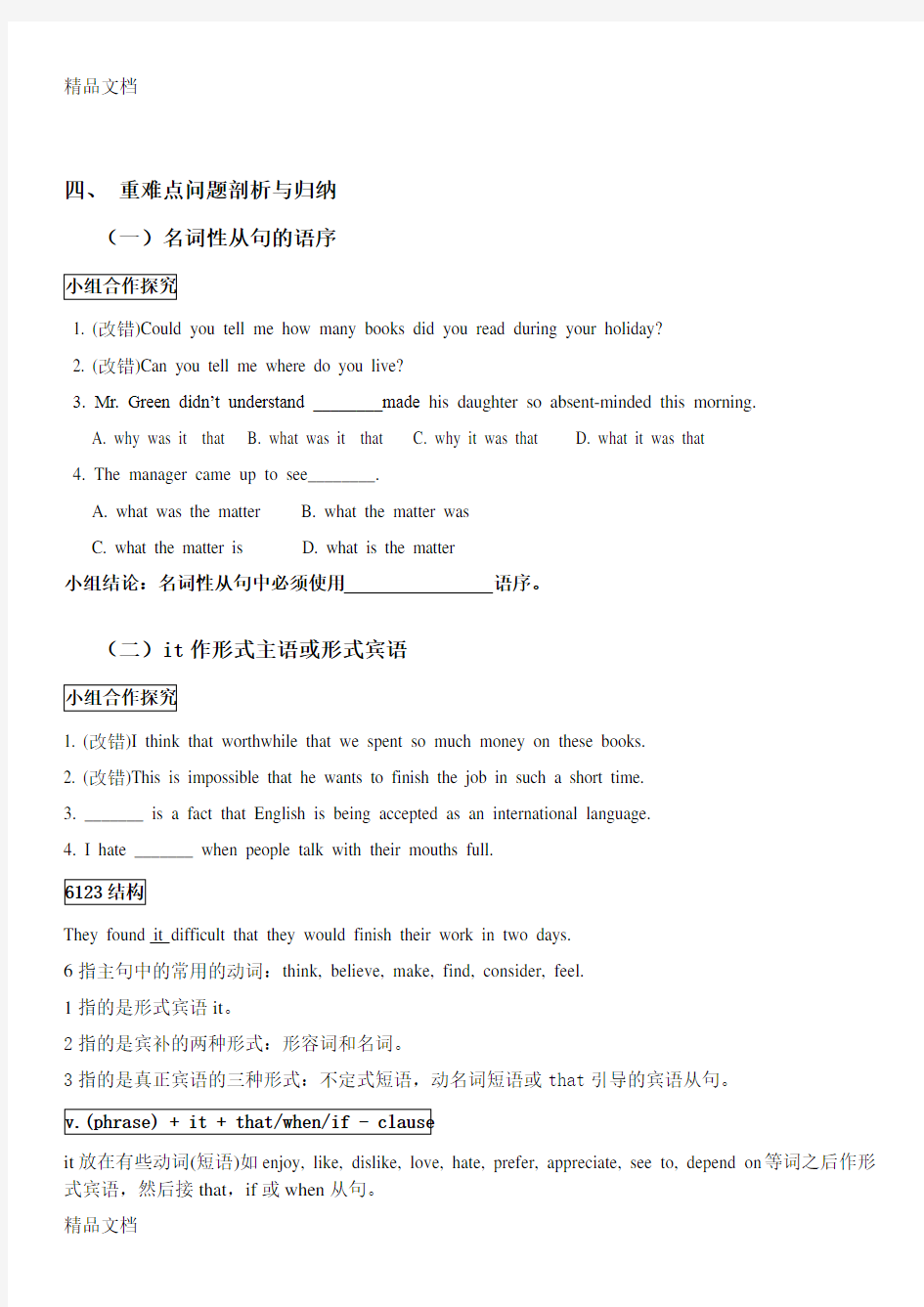最新名词性从句导学案


高一英语语法专题 (名词性从句)导学案
Grammar: the Noun Clauses
一、Definition定义
在主从复合句中,起作用的句子叫作名词性从句。它的功能相当于名词或名词词组,在复合句中能担任、、和。因此,根据它在句中不同的语法功能,名词性从句又分为、、和。
二、Classification分类
判断下列从句所充当的句子成分:
1. His eyes stare at what is left of the brothers' dinner on the table.
2. I'm afraid it'll cost a large amount of money.
3. It is well known that Americans like to eat a lot.
4. What is even more important is that as the earth cooled down, water began to appear on its surface.
5. That's why we've given you the letter.
6. I can't say that I have any plans.
7. His suggestion that we should act at once is practical.
8. It was not clear whether the shape would last or not.
三、Conjunctions 连接词
四、重难点问题剖析与归纳
(一)名词性从句的语序
1. (改错)Could you tell me how many books did you read during your holiday?
2. (改错)Can you tell me where do you live?
3. Mr. Green didn’t understand ________made his daughter so absent-minded this morning.
A. why was it that
B. what was it that
C. why it was that
D. what it was that
4. The manager came up to see________.
A. what was the matter
B. what the matter was
C. what the matter is
D. what is the matter
小组结论:名词性从句中必须使用语序。
(二)it作形式主语或形式宾语
1. (改错)I think that worthwhile that we spent so much money on these books.
2. (改错)This is impossible that he wants to finish the job in such a short time.
3. _______ is a fact that English is being accepted as an international language.
4. I hate _______ when people talk with their mouths full.
They found it difficult that they would finish their work in two days.
6指主句中的常用的动词:think, believe, make, find, consider, feel.
1指的是形式宾语it。
2指的是宾补的两种形式:形容词和名词。
3指的是真正宾语的三种形式:不定式短语,动名词短语或that引导的宾语从句。
it放在有些动词(短语)如enjoy, like, dislike, love, hate, prefer, appreciate, see to, depend on等词之后作形式宾语,然后接that,if或when从句。
I hate it if you say such things in public.
I would appreciate it very much if you would help me with it.
See to it that you're not late again.
小组结论:在从句和从句中,可以用it做形式主语和形式宾语。
(三)what 与 that 的用法区别
用what,that填空
1.I can’t underst and is why he has changed his mind.
2. ___________ the earth is round is known to us all.
3.we can’t get seems better than _________ we have.
4.he won the race was we expected.
小组结论:只起连接作用,在从句中不充当任何成分,没有词义。起连接作用,且在从句中充当主语,宾语或表语,表示“所……的”。
(四)that 省略与否问题
1. I heard (that) he joined the army.
2. That they are good at English is known to us all.
3. The problem is that we don’t have enough money.
4. She expressed the hope that they would come to China one day.
小组结论1:一般情况下,在,,从句中,that不可省略。
1. He judged that, because he was a child, he did not understand it.
2. He said (that) he was wrong and that he would say sorry to me.
3. The reason lies in that she works harder than the others.
4. We think it impossible that he can finish the task in such a short time.
小组结论2:在_________从句中that通常可以省略,但有四种情况that通常不可省略:(五)whether 与 if 的用法区别
用whether 与 if填空
1. I don’t know I’ll be free tomorrow.
2. I don’t know or not I’ll be free tomorrow.
3. I don’t know to walk there.
4. The question is this book is worth writing.
5.life will continue on the earth for millions of years will depend on this problem can be solved.
6. The question we need more time to do the work has not been discussed.
小组结论:只能使用whether的五种情况:
(六)what, who, which与 whatever, whoever, whichever的区别
用what, who与whatever, whoever填空
1.___________ made the long distance call to him is not important.
2.___________ breaks the law will be punished.
3.___________ is worth doing is worth doing well.
4. we need is more time.
小组结论1:whatever/whoever/whichever等引导的名词性从句不含有疑问意义,其汉语意思分别是:___________,___________,___________。而what/who/which等引导的名词性从句都含有疑问意义。
1.Whatever he said was true.
2.You can buy whatever you like here.
3. Whatever/ No matter what season it is , the man always wears his funny-looking hat.
4. Whatever/No matter what he says, I won't believe him.
小组结论2:whoever, whatever, whichever既可以引导___________,又可以引导___________。
no matter who , no matter what, no matter which只能引导___________ 。
(七)名词性从句中虚拟语气的考察
1. He suggested that a meeting (should) be held immediately.
2. It was suggested that a meeting (should) be held immediately.
3. His suggestion was that a meeting (should) be held immediately.
4. He made a suggestion that a meeting (should) be held immediately.
5. It is very important that a student (should)learn English well.
6. (单选)It is necessary that a college student ______ at least a foreign language.
A. masters
B. should master
C. mastered
D. will master
小组结论:表示坚持,命令,建议,要求等的名词性从句中,谓语动词用虚拟语气,其结构为,__________ 可以省略。
(八)同位语从句与定语从句的区别
1. I heard the news _____________they won the battle.
2. I heard the news _____________Tom told us.
小组结论1:同位语从句的前面是表示____________的名词,例如:thought, question, doubt, problem, news, word, idea, plan, etc. ____________是形容词性的从句, 它与先行词是修饰与被修饰的关系。
_____________是名词性从句,是对前面名词作进一步的补充性解释说明。
小组结论2:引导____________的that是从属连词,在从句中不充当任何成分;而引导____________的that为关系代词,在从句中充当一定的句子成分。
